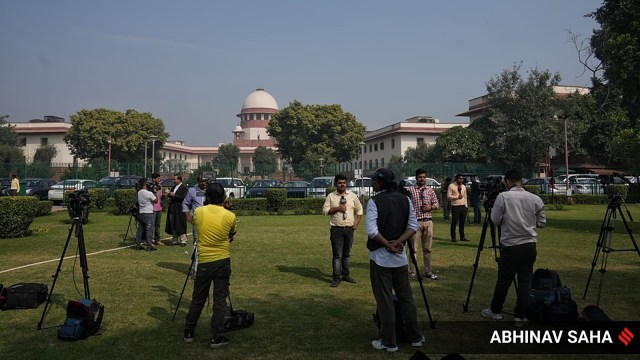A two-judge bench presided by Justice Sanjiv Khanna issued notice on a plea by Congress leaders Jaya Thakur and Sanjay Narayanrao Meshram.

“Please, we can’t stay a statute like this,” Justice Khanna said as Senior Advocate Vikas Singh, appearing for the petitioners, pressed for a stay.
Story continues below this ad
Singh told the bench also comprising Justice Dipankar Datta that the new law was against the concept of separation of powers. He also referred the bench to the March 2, 2023 Constitution bench ruling which had directed that the CEC and ECs shall be appointed on the advice of a committee comprising the Prime Minister, Leader of Opposition in the Lok Sabha and the Chief Justice of India. Where no leader of Opposition is available, the committee was to include the leader of the largest Opposition party in the Lok Sabha, in terms of numerical strength.
Article 324(2) of the Constitution says that the CEC and ECs shall be appointed by the President, with aid and advice of the Council of Ministers, till Parliament enacts a law fixing the criteria for selection and conditions of service and tenure.
Subsequently, the government enacted a new law — The Chief Election Commissioner and Other Election Commissioners (Appointment, Conditions of Service and Term of Office) Act, 2023 — excluding the CJI from the selection panel.
This was challenged before the Supreme Court by Thakur and Meshram who contended that the new law does not provide an “independent mechanism” for the appointment of the members of the Election Commission of India and is thus violative of the principle of free and fair elections.
Story continues below this ad
The petitioners argued that the new law also went against the 2023 Supreme Court five-judge bench ruling which restricted the government’s power to appoint CEC and ECs. The plea said that the new law has diluted the Supreme Court judgment by keeping the CJI out of the process of selection. It pointed out that the Supreme Court had in the past held that “mandamus issued by” it “cannot be overruled by the legislature and separation of power is also the basic structure of the Constitution”.
The plea also said that “functioning of the Election Commission greatly determines the quality of governance and strength of democracy and in view of the great constitutional importance of the Election Commission, the fairness and transparency in the mode of the procedure of appointment of the chief election commissioner and its members becomes very crucial”.
On December 9, 2023, President Droupadi Murmu had given assent to the new law passed by Parliament.
At a recent launch of his new book, former Union law minister Ashwani Kumar had criticised the Supreme Court ruling on the selection of election commissioners. “The truth is some of its judgments are very disappointing…For e.g., you virtually rewrite the Constitution in the election commissioner’s case…I don’t agree with that judgment at all. Its premises are flawed. It amounts to virtually rewriting the Constitution against the will of Parliament and brings it in conflict with another great institution of democracy. After all, we can’t forget, whatever the aberrations may be, but Parliament as representative of the will of the people is the supreme democratic institution…,” Kumar had said.
The court will hear the matter next in April.









